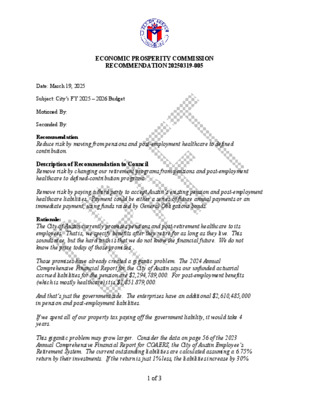Item 5: Draft Recommendation — original pdf
Backup

ECONOMIC PROSPERITY COMMISSION RECOMMENDATION 20250319-005 Date: March 19, 2025 Subject: City’s FY 2025 – 2026 Budget Motioned By: Seconded By: Recommendation Reduce risk by moving from pensions and post-employment healthcare to defined contribution. Description of Recommendation to Council Remove risk by changing our retirement programs from pensions and post-employment healthcare to defined-contribution programs. Remove risk by paying a third party to accept Austin’s existing pension and post-employment healthcare liabilities. Payment could be either a series of future annual payments or an immediate payment, using funds raised by General Obligations bonds. Rationale: The City of Austin currently promises pensions and post-retirement healthcare to its employees. That is, we specify benefits after they retire for as long as they live. This sounds nice, but the hard truth is that we do not know the financial future. We do not know the price today of those promises. Those promises have already created a gigantic problem. The 2024 Annual Comprehensive Financial Report for the City of Austin says our unfunded actuarial accrued liabilities for the pension are $2,294,789,000. For post-employment benefits (which is mostly healthcare) it is $1,851.879,000. And that’s just the government side. The enterprises have an additional $2,610,485,000 in pension and post-employment liabilities. If we spent all of our property tax paying off the government liability, it would take 4 years. This gigantic problem may grow larger. Consider the data on page 56 of the 2023 Annual Comprehensive Financial Report for COAERS, the City of Austin Employee’s Retirement System. The current outstanding liabilities are calculated assuming a 6.75% return by their investments. If the return is just 1% less, the liabilities increase by 30%. 1 of 3 This problem hurts us right now. Page 34 of the 2024-25 budget says we paid $151,781,000 to pay down just 1/30th of the liability. Austin’s government charged a family of four more than $50 per month not to provide services, but just to pay down a tiny fraction of our $4 billion debt. Pensions and healthcare promises are dangerous. They crippled America’s car industry. They almost ended America’s steel industry. Multiple cities have declared bankruptcy due to the burdens of pension and healthcare. Detroit, Michigan, which was the fastest growing city in America in its heyday, went bankrupt due to pensions. Pension programs and healthcare promises can harm more than the City of Austin; they might harm our employees in the future who would be relying on the City of Austin for those pension and healthcare in their retirement. To ensure the City of Austin’s economic prosperity, it should not make unpredictable promises about the future. It should “pay as we go” with its employees. That means a defined contribution plan, which puts a fixed-multiple of the employee’s salary into a retirement program this fiscal year, without any promises about the future. Companies and non-profits have done it. Government should too. Recommendation The Budget of the City of Austin should respect renters as the equal of homeowners. Description of Recommendation to Council Require that the City of Austin 2025-26 Budget respect renters as "Typical" residents of Austin. Require that the City of Austin 2025-26 Budget's "Taxpayer Impact Statement" add a line for the average tax per rental unit, which includes the property tax and all other taxes and annual fees on rental properties. Require that the City of Austin 2025-26 Budget's "Taxpayer Impact Statement" rename the line "TOTAL YEARLY IMPACT" to "TOTAL YEARLY IMPACT (homeowner)" and add a line for "TOTAL YEARLY IMPACT (renter)", which includes the average taxes and fees paid per rental unit. Require that the City of Austin 2025-26 Budget's "Taxpayer Impact Statement" include a calculation of "TOTAL YEARLY IMPACT (renter)" for the previous budget, Fiscal Year 2023- 24, and compute a percentage increase from Fiscal Year 2023-24 to Fiscal Year 2025-26. Require that the City of Austin 2025-26 Budget's "Taxpayer Impact Statement" use the bottom half of the page to hold a table of "TOTAL YEARLY IMPACT" for Austin residents at all income levels. Rows should be by household income for every 10th percentile, from bottom 10% to top 10%. City Staff should estimate what proportion of each income bracket are homeowners and renters and assign an average (mathematical mean) property tax weighted by that proportion, based on properties that income bracket would rent or own. City Staff may have more detailed knowledge. They should investigate if residents in the bottom 10th percentile of income uses the average (mathematical mean) of the bottom 10th percentile of residential Austin Energy usage, residential Austin Water usage, etc.. Rationale: 2 of 3 The City of Austin 2024-25 Budget's “Taxpayer Impact Statement” refers to a ““Typical” Resident Ratepayer” who pays property tax with a homestead exemption and, therefore, must be a homeowner. The 2024-25 budget claims that this “Typical” Austin resident owns a house worth $524,082. In fact, the City of Austin actually has a majority of renters. The U.S. Census Bureau for the time period 2017-2021 reports that only 44.7% of the housing units in Austin are owner-occupied. A household owning a property worth $524,082 is likely in the top 25th percentile of income for the City of Austin. (And an even higher percentile of the metropolitan area income.) Moreover, Austin's African-American and Hispanic/Latino households are even more likely to be renters. The Housing and Planning Department reports that, based on 2020 US Census data, 28.2% of African- American households owned their home and 36.5% of Hispanic/Latino households owned their home. By changing the “Taxpayer Impact Statement” in the 2025-26 budget to include renters and Austinites of all incomes, Austinites will be better able to judge the impact on their own finances and the impact on our less fortunate residents. It may also broaden the attention of City Council and staff, to ensure that Austin’s economic prosperity is shared with all Austinites. Vote For: Against: Abstain: Absent: Attest: [Staff or board member can sign] 3 of 3